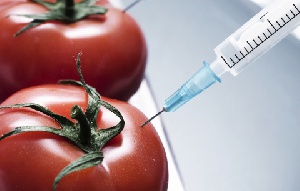A policy symposium on the need to collate views to push forward the adoption of Genetically Modified Organisms (GMOs) by Ghana was held in Accra on Wednesday.
The symposium was on the theme; “Accepting or Not Accepting GMOs; implications for sustainable food production in Ghana.”
Organised by Developing Research Uptake in Sub-Saharan Africa, ISSER, DFID, Centre for Scientific and Industrial Research (CSIR), Association of Commonwealth Universities and the Ministry of Food and Agriculture, (MOFA). It attracted scientists, research analysts in the area of food and agriculture.
The symposium which was meant to discuss issues both for and against GMO saw only majority of participants who are in support of GMO taking part.
Dr Hans Adu Dapaah, Former Director Crops Research Institute (CRI) said there is no credible evidence that GM foods are more harmful than non-GM foods.
Dr Dapaah said the genes introduced into GMOs are not different from any other DNA present in plants or animals, adding that GMOs do not pose any health risks to humans or animals, citing an example that in the US and the Food and Drugs Authority regarding all GMOs as generally safe for food and pharmaceutical use.
There is the need to build human and institutional capacity rather than to reject the technology and called for a rigorous enforcement of the biosafety Act.
According to him trials in Ghana showed that the National Biosafety Committee had approved the conduct of four confined field trials on, GM rice (NEWEST rice) – by CSIR-CRI, Nitrogen use efficient, water use efficient and salt tolerant, among other things for research purpose only and is non-commercial.
Dr Dapaah said to achieve food security by 2050, crop production would have to double/triple using fewer and diminishing resources such as land, water, nitrogen among other things, adding that conventional crop improvement alone would not double crop production and therefore GM crops would complement conventional methods.
Climate change including drought, flood, heat, erratic rainfall, illegal mining (galamsey) activities destroying agricultural lands and water bodies and distorting ecologies, land constraints are some of the challenges facing agricultural production in Ghana.
He however noted that GMs had benefits such as the ability of crops to grow on poor soils and crops like Bt Cow pea and Bt cotton were pest resistance.
GM crops are also herbicide tolerant for example “Roundup ready soybean”, uses less spray and reduced costs.
Dr Wilhelmina Quaye, a participant who spoke on the topic; Contributing to the food sovereignty debate: Re-linking local production and consumption, said Ghana could not depend on food imports but should rely on internally generated foods.
She said over reliance on foreign technologies had resulted into disconnections in production-consumption systems.
She however expressed fears in such areas as loss of Governments' authority to regulate important national policy areas such as trade, biodiversity and even land policy.
The policy space for the nation's own decision is increasingly reduced, since international norms are prescribing what is possible at the national level
Civil society should mounts pressure on the state to review their policies to reflect food sovereignty issues, Dr Quaye added.
Dr Ahmed Yakubu Alhassan, Deputy Minister of Food Agriculture said it is good for farmers to keep changing seeds because they produce good yield in the coming years, explaining that farmers who are refusing to change seeds are not doing any good farming practice.
Mr Maurice Tanco Abisa-Seidu, Chief Director of MOFA called for extensive public education on the importance of GMOs.
Regional News of Thursday, 11 December 2014
Source: GNA

















